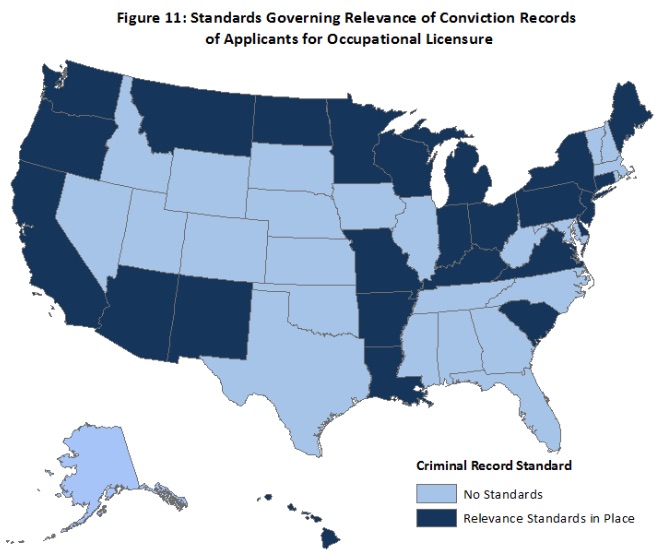
Source: Legal Action Center via the White House
Yesterday I discussed a new report that showed, among other things, that North Carolina makes it harder than most other states for someone with a criminal record to get an occupational license. That’s a problem because, as the report from the National Employment Law Project (“Fair Chance Licensing Reform“) showed:
- 15 percent of North Carolinians have arrest or conviction records
- North Carolina released over 16,000 people from prison in 2015
- finding work helps prevent recidivism
As the Institute for Justice explained in the new edition of “License to Work,”
The most straightforward way to ensure individuals with a criminal record are not held back for lack of a license is to repeal unnecessary licenses and replace them, if necessary, with less restrictive regulation. Licensing itself, not just exclusions based on criminal records, creates barriers for former offenders trying to enter or reenter the workforce.
But where licenses are not eliminated, lawmakers should limit license denials based on criminal history to those cases where the crime is relevant and there is evidence that the likelihood of harm to public health and safety would increase if the state grants the license.
Making disqualifying conviction records relevant to the license sought was one of the many reforms listed in the Obama administration’s major 2015 report, “Occupational Licensing: A Framework for Policymakers.” Many states do, as the report showed:
In contrast, 25 States have standards in place that require some kind of relationship between the license sought and the applicant’s criminal history. For instance, the Texas Occupations Code states that “each licensing authority shall issue guidelines … [stating] the reasons a particular crime is considered to relate to a particular license.”
While some offenses, like homicide and assault, are disqualifying crimes for many licenses in Texas, other offenses only disqualify applicants for specific licenses for which the conviction is relevant. For example, the Texas Occupations Code provides that a conviction for animal cruelty is a basis for denying or revoking a licensed breeder license, while a conviction for driving while intoxicated is a basis for denying a tow truck operators’ license.
In 2013, the General Assembly passed Senate Bill 33, which addressed this issue somewhat. Nevertheless, it gave broad deference to the licensing boards’ discretion
It stipulated that a licensing board “shall not automatically deny licensure on the basis of an applicant’s criminal history,” but beyond that would allow denial merely if the board “finds that denial is warranted after consideration of” several factors, including many details of the crime and the “nexus between the criminal conduct and the prospective duties of the applicant as a licensee.”


